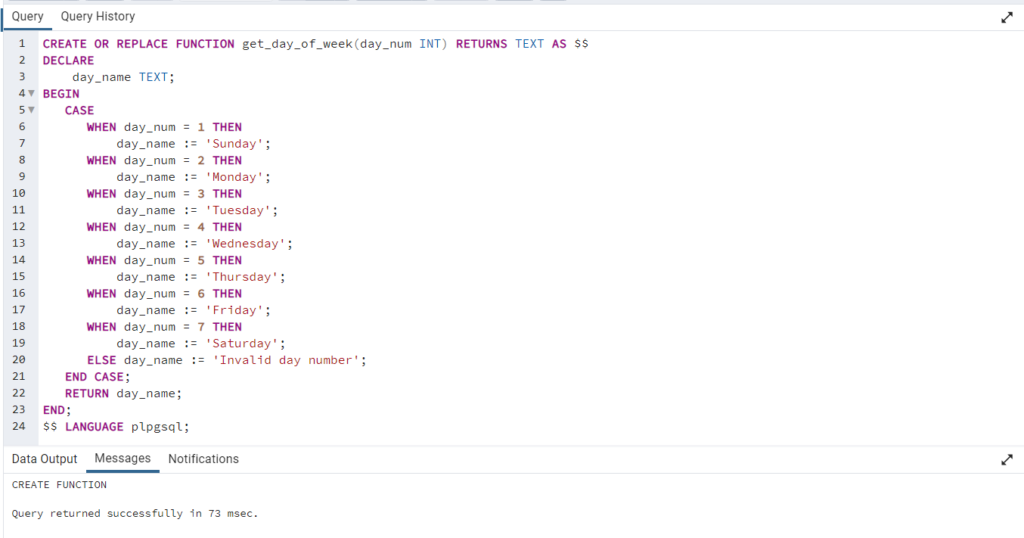PL/pgSQL – CASE Statement
In PostgreSQL’s PL/pgSQL, you can use the CASE statement to perform conditional branching based on specific conditions. The CASE statement allows you to evaluate different conditions and execute different code blocks depending on the outcome of those conditions. It’s similar to the IF statement but provides more flexibility when you need to test multiple conditions.
Here’s the basic syntax of the CASE statement in PL/pgSQL:
CASE WHEN condition1 THEN-- Code to execute if condition1 is trueWHEN condition2 THEN-- Code to execute if condition2 is true... ... ...ELSE-- Code to execute if none of the conditions are true (optional)END CASE;
where
condition1,condition2, etc. are the conditions that you want to evaluate. If a condition is true, the corresponding code block will be executed. You can have multipleWHENclauses, each with its own condition.-- Code to executeis the code that will be executed if the condition associated with theWHENclause is true.ELSEis optional. If none of the conditions in theWHENclauses are true, the code block followingELSEwill be executed. You can have only oneELSEblock, and it comes at the end.END CASE;marks the end of theCASEblock.
Here’s an example of a PL/pgSQL function that uses the CASE statement to determine the day of the week based on an input number:
CREATE OR REPLACE FUNCTION get_day_of_week(day_num INT) RETURNS TEXT AS $$DECLAREday_name TEXT;BEGINCASEWHEN day_num = 1 THENday_name := 'Sunday';WHEN day_num = 2 THENday_name := 'Monday';WHEN day_num = 3 THENday_name := 'Tuesday';WHEN day_num = 4 THENday_name := 'Wednesday';WHEN day_num = 5 THENday_name := 'Thursday';WHEN day_num = 6 THENday_name := 'Friday';WHEN day_num = 7 THENday_name := 'Saturday';ELSE day_name := 'Invalid day number';END CASE;RETURN day_name;END;$$ LANGUAGE plpgsql;
In this example:
- The function
get_day_of_weekaccepts an integer parameterday_num. - The
CASEstatement evaluates the value ofday_numand assigns the corresponding day name to theday_namevariable. - If
day_numdoesn’t match any of the specified conditions, theELSEblock is executed, and “Invalid day number” is assigned today_name. - The function returns the
day_namevariable as text.
You can call this function and pass different values for day_num to get the corresponding day name:
SELECT get_day_of_week(1);-- Returns 'Sunday'SELECT get_day_of_week(4);-- Returns 'Wednesday'SELECT get_day_of_week(8);-- Returns 'Invalid day number'



The CASE statement is a powerful tool for conditional branching in PL/pgSQL and is especially useful when you need to evaluate multiple conditions and execute different code blocks based on those conditions.